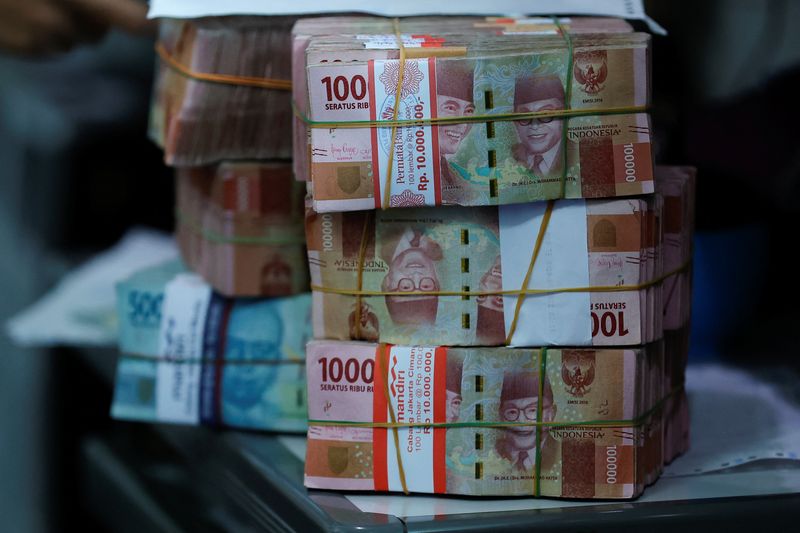Arishma Iyer
(Reuters) – Investors lifted short positions in emerging Asian currencies, with bearish bets on the Indonesian rupiah jumping as the U.S. dollar remained resilient amid uncertainty over the timing of an interest rate cut by the Federal Reserve, a Reuters poll showed on Thursday.
Short positions in the Indonesian rupiah strengthened to their highest level since November 2, while positions in the Thai baht jumped to their highest level since October 2022, according to a biweekly survey of 11 analysts.
Recent strong US manufacturing activity and labor market data have cast a shadow on the extent of the Fed’s rate cuts this year, supporting the dollar.
“Ahead of Friday’s non-farm payrolls data, we believe there is still a strong buying trend in the foreign exchange market for U.S. dollars,” said Ryota Abe, economist at Sumitomo Mitsui (NYSE:) Banking Corp.
“Under these circumstances, traders have little incentive to buy Asian currencies,” he added.
Bearish bets on the rupee strengthened as inflation accelerated in Southeast Asia’s largest economy. The currency’s fall on Monday prompted the central bank to intervene in the foreign exchange market.
With the move towards the psychological level of 16,000 pips imminent, analysts believe that a rate hike by Bank Indonesia is not ruled out.
“It is believed that a one-sided currency depreciation could reignite bids for a rate hike, similar to the one-off move in October 2023,” Radhika Rao, senior economist at DBS, said in a note.
Elsewhere, China’s central bank authorities also intervened to prevent the yuan from falling further as markets expected further depreciation.
Moreover, the baht came under pressure due to weaker growth in Thailand’s tourism-reliant economy, a dividend payout season for foreign investors and disagreements over rate cuts between the government and the central bank, multiple analysts said.
Bearish positions on the Taiwan dollar and South Korean won rose a notch to reach their highest levels since early November.
Poon Panichpibul, market strategist at Krung Thai Bank, said he expects the Taiwan dollar and South Korean won to be “highly volatile if tech stocks undergo a correction, which could happen as these stocks have been rallying significantly lately.”
Meanwhile, investors who had been slightly bullish on the Indian rupee this year so far have now cut their bets and turned neutral due to concerns about the Fed’s stance on interest rates.
The Asian Currency Positioning Survey focuses on what analysts and fund managers believe is the current market position of nine Asian emerging market currencies: Chinese yuan, South Korean won, Singapore dollar, Indonesian rupiah, Taiwan dollar, Indian rupee, Philippine peso, Malaysian dollar. ringgit and thai baht.
The survey uses estimates of net long or short positions on a scale of minus 3 to plus 3. A score of plus 3 indicates the market is significantly long US dollars.
The figures include positions occupied by non-deliverable forwards (NDF).
The survey results are presented below (positions in US dollars against each currency):
DATE
April 4, 24 1.18 1.09 0.42 1.13 1.17 0 1.15 0.62 1.35
03/21/24 0.92 0.82 0.33 0.6 0.92 -0.54 1.12 0.47 1.13
03/07/24 0.84 0.54 0.25 0.53 0.64 -0.59 1.14 0.52 1.05
02/22/24 0.7 0.4 0.2 0.2 0.7 -0.4 1.3 0.3 1.1
February 8, 24 0.4 0.39 0.41 0.4 0.32 -0.17 1.07 0.28 0.72
January 25-24 0.37 0.9 0.28 0.51 0.49 -0.18 1.21 0.5 0.9
01/11/24 0.18 0.3 0.02 0.19 0.05 -0.15 0.72 0.09 0.03
December 14, 23 0.02 -0.09 -0.22 -0.05 -0.33 0.34 0.58 -0.22 0.16
November 30, 23 0.12 -0.05 -0.07 -0.05 -0.13 0.63 0.73 -0.1 -0.1

November 16, 23 0.77 0.49 0.38 0.77 0.63 0.82 1.14 0.38 0.28
November 2, 23 1.32 1.18 0.74 1.44 1.31 1.35 1.33 0.96 0.85


